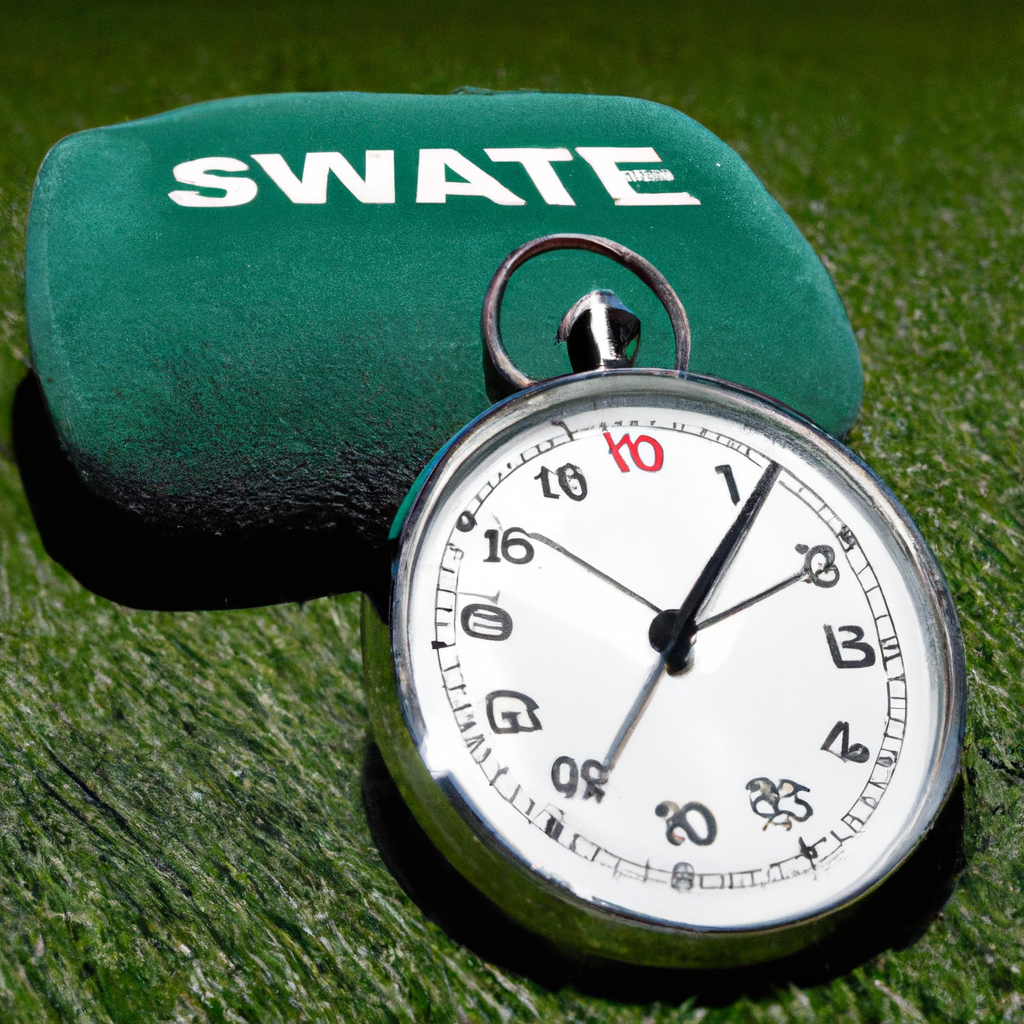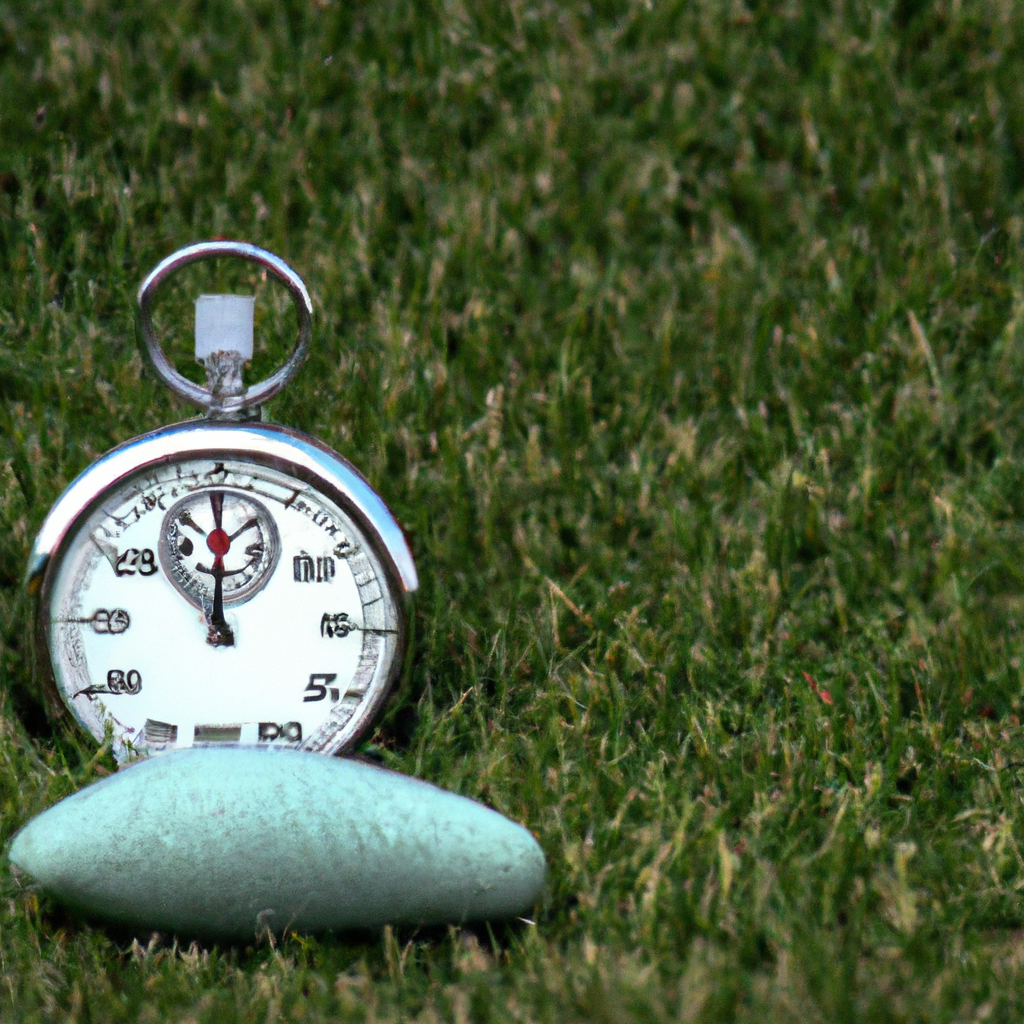We may earn money or products from the companies that may be mentioned in this post.
Imagine this: you’re standing on the lush green fairway, the sun shining above, with a gentle breeze rustling through the trees. You’ve got your golf clubs in hand and a sense of anticipation fills the air. But how long will this pleasant round of 9 holes actually take? In this article, we’ll explore the time it takes to play 9 holes of golf, giving you an insight into just how much time you’ll need to set aside for this enjoyable sport. So, grab your favorite golf hat and get ready to tee off!

Factors Affecting the Time to Play 9 Holes of Golf
When it comes to playing a round of golf, the time it takes to complete 9 holes can vary depending on a variety of factors. These factors can include the number of players, the skill level of the players, the course layout, the course conditions, the pace of play, the type of golf game being played, the weather conditions, the tee time, the availability of carts, and other miscellaneous factors. Let’s take a closer look at each of these factors and how they can affect the time it takes to play 9 holes of golf.
Number of Players
The number of players in a group can have a significant impact on the time it takes to play 9 holes of golf. Generally, the more players there are, the longer it will take to complete the round. This is because each player needs to take their turn to hit the ball, which can add up to a considerable amount of time. However, the pace of play can also be affected by the skill level of the players, as we will discuss in the next section.
Individual Play
Playing golf individually can be the quickest way to complete 9 holes. Since there is only one player, there is no waiting time between shots, allowing for a faster pace of play.
Two Players
Playing with just one other person can still result in a relatively quick round. With only two players, there is less waiting time between shots compared to larger groups, making it easier to maintain a steady pace.
Foursome
Playing in a foursome, which is the most common way people play golf, can take longer than individual or two-player play. With four players, there is more waiting time between shots, as each player needs to hit the ball before moving on to the next hole.
Skill Level of Players
The skill level of the players can also have a significant impact on the time it takes to complete 9 holes of golf.
Experienced Players
Experienced players often have a better understanding of the game, allowing them to play more efficiently and quickly. They can navigate the course more effectively, make strategic shot choices, and have a better overall flow of play.
Average Players
Average players may have a decent understanding of the game but may take slightly longer to make decisions and execute shots. While they may not be as quick as experienced players, they can still maintain a reasonable pace of play.
Beginner Players
Beginner players, who may still be learning the game, tend to take more time to analyze their shots and execute them. They may also need to spend extra time looking for their balls if they go off course. As a result, rounds with beginner players may take longer to complete.

Course Layout
The layout of the golf course can greatly influence the time it takes to play 9 holes. Some key factors to consider include the length of the holes, the number of par 3, 4, and 5 holes, and the degree of difficulty.
Length of Holes
The length of the holes can affect the overall time to complete a round. Longer holes typically require more shots to reach the green, resulting in more time being spent on each hole.
Number of Par 3, 4, and 5 Holes
The proportion of par 3, 4, and 5 holes on the course can also affect the time it takes to play 9 holes. Par 3 holes are generally shorter and can be played more quickly, while par 5 holes are longer and require more shots, thus taking more time.
Degree of Difficulty
The difficulty of the course can impact the time it takes to play 9 holes. If the course is particularly challenging with narrow fairways, deep bunkers, or dense rough, it may take players longer to navigate their shots and find their balls if they go astray.
Course Conditions
The condition of the golf course can play a role in the pace of play and the time it takes to complete 9 holes. Consider these factors:
Maintenance Schedule
If the course is undergoing maintenance or if there are ongoing renovations, it can slow down play as players may need to wait for machinery or workers to clear the area before they can proceed.
Green Speed
The speed of the greens can also influence play time. Faster greens typically require more precision and care when putting, which can slow down play. Conversely, slower greens may result in a faster pace as players may be less cautious in their approach.
Fairway Conditions
If the fairways are well-maintained and clear of debris, it can facilitate faster play as balls will roll smoothly. However, if the fairways are in poor condition or have excessive divots, it can impact the efficiency of play and slow down the game.
Bunker Conditions
The condition of the bunkers can also affect playtime. If the bunkers are well-groomed and have consistent sand quality, players can quickly navigate their shots. However, poorly maintained bunkers or inconsistent sand can lead to longer waits and slower play.
Rough Conditions
The thickness and length of the rough can impact playtime. If the rough is dense and difficult to navigate, players may spend significant time searching for errant shots, resulting in delays and slower play.
Pace of Play
The pace of play is a crucial factor in determining how long it takes to complete 9 holes of golf. Several factors can contribute to the pace of play, including the following:
Busy Periods
During peak times, such as weekends or holidays, golf courses tend to be busier, which can lead to slower play. With more groups on the course, there may be delays in moving from hole to hole, resulting in increased overall playtime.
Number of Groups on the Course
The number of groups on the course at any given time can directly impact the pace of play. If there are fewer groups, it allows for a quicker flow between holes and less time spent waiting for other players to hit their shots.
Slow Playing Groups
Occasionally, players or groups may play at a slower pace than usual, resulting in bottlenecks and delays for other groups behind them. Delays caused by slow-playing groups can prolong the time it takes to finish 9 holes.
Efficiency of Players
Efficiency in playing can significantly impact the pace of play. Players who are organized, ready to hit their shots, and adhere to golf etiquette, such as being prepared with clubs and ready to go when it’s their turn, can maintain a quicker pace and contribute to a faster round.
Type of Golf Game
The type of golf game being played can influence the time it takes to complete 9 holes. Different game formats have their own unique characteristics that can affect playtime. Consider the following:
Stroke Play
In stroke play, each player counts every stroke they make on each hole. This format can potentially slow down play as players take their time to record their scores after each hole and ensure accuracy.
Match Play
Match play involves players competing hole by hole, with the goal of winning the most holes. This format tends to be quicker as players are focused on winning individual holes rather than recording every stroke.
Scramble
Scramble is a format where players play as a team and select the best shot after each stroke. This format tends to be faster as players can quickly move from shot to shot without needing to wait for other players to complete their shots.
Alternate Shot
Alternate shot, also known as foursomes, involves two players playing as a team and taking turns hitting the ball. This format can be slower as players need to wait for their partners to hit their shots before proceeding.
Weather Conditions
Weather conditions can significantly impact the time it takes to play 9 holes of golf. Various weather elements can influence the pace of play:
Rainy Weather
Playing in wet conditions can slow down play as players need to take extra precautions while swinging and moving on slippery surfaces. Additionally, rain can affect the visibility of the ball, resulting in potential delays in finding lost shots.
Windy Conditions
Playing in windy conditions can make it more challenging to control the ball’s flight, leading to longer shots and potential delays. Players may also need to take extra time to calculate wind speeds and directions, impacting the overall pace of play.
Extreme Heat
Playing in extremely hot weather can be physically demanding and can affect players’ energy levels and concentration. This can result in slower play as players may need to take more breaks to stay hydrated and to conserve their energy.
Foggy Conditions
In foggy conditions, visibility is often reduced, making it difficult for players to see the fairway, hazards, and even their fellow players. This can lead to slower play as players take extra time to ensure that it’s safe to proceed.
Tee Time
The timing of your tee time can also impact the time it takes to play 9 holes.
Morning Tee Time
Starting in the morning can often result in a faster pace of play. The course is typically less crowded, and the weather conditions are usually cooler, allowing players to move through the course more efficiently.
Afternoon Tee Time
Playing in the afternoon, especially during peak hours, can result in slower play. The course may be busier, leading to more frequent delays and longer waiting times between shots.
Availability of Preferred Tee Time
Securing your preferred tee time can also impact your overall round time. If you’re able to secure a tee time during a less busy period, you may experience a quicker pace of play.
Other Factors
There are additional factors that can influence the time it takes to complete 9 holes of golf.
Group Dynamics
The dynamics within a group can impact the overall pace of play. If players have good communication and coordination, they can move efficiently through the course. However, conflicting personalities or disagreements can slow down play.
Lost Balls
Golf balls can occasionally go astray, resulting in additional time spent searching for them. Lost balls can be even more time-consuming if the rough or hazards are difficult to navigate.
Player Etiquette
Adhering to proper golf etiquette can contribute to a smoother and faster round. This includes being ready to play when it’s your turn, keeping pace with the group in front, and ensuring you are not causing any unnecessary delays.
Wait Times for Other Groups
Sometimes, there may be wait times between holes due to congestion on the course. These waits can prolong playtime, particularly if there are insufficient gaps between groups.
In conclusion, the time it takes to play 9 holes of golf can vary significantly based on various factors. The number of players, skill level, course layout, course conditions, pace of play, type of golf game, weather conditions, tee time, availability of carts, and other factors all contribute to the overall round time. By considering these factors and understanding their potential impact, golfers can plan and adjust their game accordingly to ensure an enjoyable and timely round of golf.
